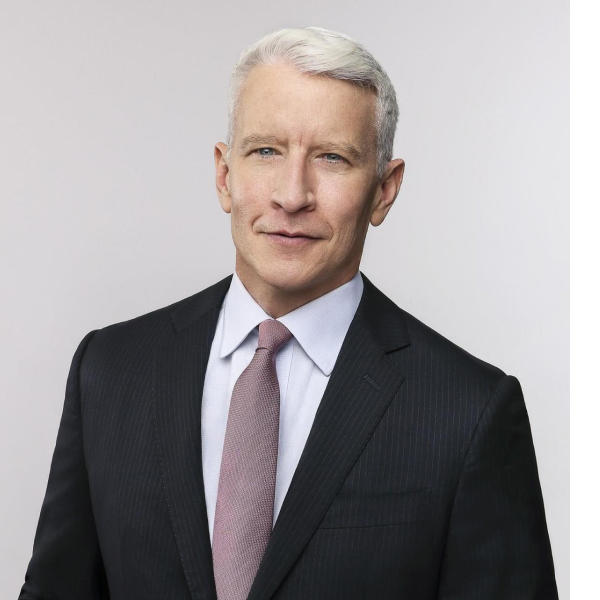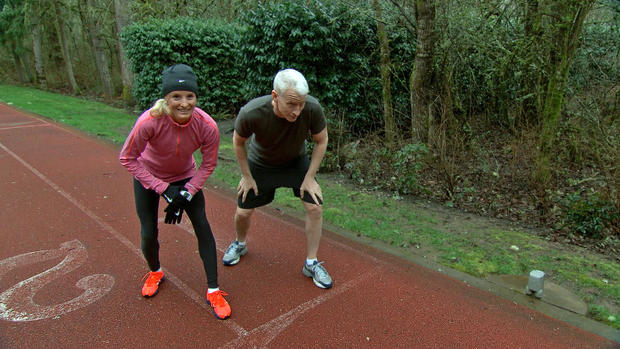Hometown favorite aims to win Boston Marathon
The following is a script from "Hometown Favorite" which aired on April 13, 2014. Anderson Cooper is the correspondent. Coleman Cowan, producer.
Eight days from now a million people are expected to line the streets of Boston to watch 36,000 runners compete in the world's oldest and most prestigious marathon.
The memory of the bombings near the finish line of last year's Boston Marathon is still fresh. And next week, the race promises to be unlike any other in its 117-year history, a chance for the city to come together and reclaim a beloved tradition that was torn apart by an act of terror.
Shalane Flanagan: Maybe it's just a Bostonian thing, but I was really genuinely just pissed off that someone would ruin such a-- what is such a celebratory day and a historical moment with that kind of action.
Anderson Cooper: You were angry?
Shalane Flanagan: I was angry. I was really pissed off that someone would do this. It's like it was a personal attack to my city.
"Maybe it's just a Bostonian thing, but I was really genuinely just pissed off that someone would ruin such a-- what is such a celebratory day and a historical moment with that kind of action."
Shalane Flanagan: It's my ultimate dream and goal to win the Boston Marathon. I am all in with this training. I have been out on the course, training on it, multiple times this fall. And I know almost every divot and bump in the road.
The Boston Marathon has been a part of Shalane Flanagan's life since she was a child. Both her parents were marathon runners. Her father ran 11 minutes off world record pace at the Boston marathon in 1980. Her mother set a women's world marathon record in 1971.
Anderson Cooper: You thought everybody's parents did that?
Shalane Flanagan: Yeah. I thought it was like church of Sunday long run.
Anderson Cooper: The church of Sunday long run?
Shalane Flanagan: That's what my dad would call it.
Long before she ever thought of running the Boston Marathon, Shalane used to stand near the finish line of the race to cheer her father on.
Shalane Flanagan: I watched from Hereford all the way down to the finish. And that's exactly the two areas where the bombs went off. So it was a surreal moment to think of that was-- I was a little kid watching my dad run right there. I mean that easily could have been me or my sister.
When the bombs exploded last year three people were killed, 264 others were injured. The youngest victim was 8-year-old Martin Richard.
William Evans: To see the young bodies lying there on Boylston Street it's something that I'll never get outta my mind.
William Evans is the new Boston police commissioner. He's also a competitive runner. Last year's marathon was the 18th he'd run in Boston.
William Evans: To have just come down that street an hour earlier with such excitement, such joy and then to return again it-- I just didn't believe that could happen on Boylston Street in the city of Boston.
Commissioner Evans wanted to run again this year, but decided he should stay in the command post to oversee security.
William Evans: You're gonna see 36,000 people on that course with the same principle: Let's prove that we won't be intimidated by what happened back in April.
Tom Grilk: The race, this year, for a great many people, will be about that. It will be seen as a response to terror, as a statement of resilience.
Tom Grilk is the executive director of the Boston Athletic Association, which has organized the marathon throughout its long history.
Tom Grilk: The event will go forward as what it has always been, both an athletic competition focused on excellence, and a celebration around here of a great event in our community.
This year, he believes more spectators than ever will be on the streets cheering on the runners.
Anderson Cooper: They wanna take part?
Tom Grilk: They wanna take part. If you're out there as a spectator and somebody comes along and their T-shirt says, "Carly," on it, a thousand people along the way will say, "Go Carly." And everybody will have a good time.
Anderson Cooper: Carly will suddenly have thousands of new friends?
Tom Grilk: Carly will look wicked happy.
Most runners in next week's marathon will just be happy to finish or reach a personal best. But for Shalane Flanagan and the other top runners, the goal is winning...and the race is as much about strategy and psychology as it is physical conditioning.
Anderson Cooper: Obviously, marathons are painful. But for you, it's about being able to deal with pain yourself, and also, inflict pain on others.
Shalane Flanagan: Uh-huh (affirm).
Anderson Cooper: That's part of the strategy.
Shalane Flanagan: Yes. You know, when I start to feel fairly uncomfortable, it's-- it's all about embracing it and realizing it's inevitable and-
Anderson Cooper: Embracing the pain?
Shalane Flanagan: Embracing it, yes. So if I'm uncomfortable, I usually know my competitors are uncomfortable. If they're straggling behind, that's kind of the time when I say, "I'm gonna put the screw in." I can tell that they're either struggling mentally or physically. So I'm gonna just push it and just see if I can break them.
Anderson Cooper: This is gonna sound like an odd question, but do you like inflicting pain on your opponents?
Shalane Flanagan: I think everyone who's got a competitive bone in their body-- to a certain degree, enjoy seeing a little bit some of the-- having their competition fall apart.
When Shalane started running in high school, there wasn't much strategy to her racing.
Shalane Flanagan: I would run so hard that I would literally make myself collapse.
Anderson Cooper: I've heard you refer to it as kamikaze racing.
Shalane Flanagan: Yeah. I mean, it's not...
Anderson Cooper: Kamikazes don't end up very well.
Shalane Flanagan: I know, but sometimes it could be brilliant.
Shalane was a champion cross country runner in college and won a bronze medal in the 10,000 meter race at the Beijing Olympics. But to compete in the marathon, Shalane needed to learn a whole new way to run.
In 2009 at the age of 28, Shalane moved to Portland, Ore., and began working with coach Jerry Schumacher.
Jerry Schumacher: We're going to do two loops, which is a little over 24 miles. I'm prepping her to learn how to run 26 miles without blowing yourself up.
Anderson Cooper: Which she had never done before?
Jerry Schumacher: Which-- yeah, 'cause she likes to go out and she likes to suffer. And in a marathon if you're suffering at mile three, you're probably not gonna finish.
Running is Shalane's full time job. She is sponsored by Nike, which allows her to focus solely on training for the Boston Marathon. She often runs twice a day, up to 120 miles a week. In addition to lifting weights, she has to rigorously monitor everything she eats. Food is fuel, but she doesn't want to gain any extra weight she'll have to carry during the marathon.
Watching Shalane and other top marathoners compete, it's easy to forget just how fast and how far they're running. Last year's female winner of the Boston Marathon, Kenyan Rita Jeptoo, closed her final mile at a pace of four minutes and fifty seconds.
Anderson Cooper: To finish a marathon, running at four-minutes-and-50-second per mile, that's incredible.
Jerry Schumacher: It's incredible. After 25 miles of running, you have to be ready. Even if it takes just that last mile, you know, to do whatever-- you gotta do whatever it takes to get in to that finish line.
To get a sense of just how fast Shalane runs during a marathon, we decided to try to keep up with her on a race track at Nike headquarters where she trains.
Anderson Cooper: This is a real race.
Shalane would run a quarter mile at her marathon race pace, and I would run as fast as I could, trying to stay with her.
Anderson Cooper: You're going to go for your marathon pace, and I'm...
Shalane Flanagan: We'll see if you like that pace.
Anderson Cooper: OK.
Jerry started us off.
Jerry Schumacher: Ready. Set. Go!
I jumped out front at first, but within a few seconds, Shalane, with her even pace, and easy, flowing stride, blew right past me...laughing all the way.
She completed the quarter mile in about 79 seconds.
Jerry Schumacher: Almost there...!
Anderson Cooper: Oh my god...
Keep in mind that to complete a marathon, you'd have to run that distance 104 more times.
Anderson Cooper: Did you feel me suffering out there?
Shalane Flanagan: Yeah. Did you hear those giggles? That was pure joy.
Anderson Cooper: You were giggling, yes.
Shalane's first marathon was in 2010 in New York City. Remarkably, she came in second behind Kenyan Edna Kipligat, completing the 26.2 miles in two hours and 28 minutes. It was the best finish by an American woman in New York in 20 years.
Anderson Cooper: What did that tell you?
Jerry Schumacher: That she can run the 26 miles. She can do the training for it. And in the right kinda race, she's gonna be definitely dangerous.
Last year, Shalane ran the Boston Marathon for the first time. Early in the race, she and the other top women were running 6-minute miles, a relatively slow pace. When Kenya's Rita Jeptoo finally picked up the pace in the last few miles, Shalane's legs couldn't keep up.
Anderson Cooper: You're actually talking to your legs while you're running?
Shalane Flanagan: Oh yeah, I have talks with 'em. Yeah, I'll look at my quads, and I'm like, "Come on, you can do this." And-- so I mean no one sees that.
Anderson Cooper: Do they respond?
Shalane Flanagan: No. They're usually like, "Hey, screw you. You know, we've been running for a long time."
Shalane finished fourth, and after the bombings was the first runner to sign up again to compete this year. For the past 12 months, she's been focused on this one race.
Memorizing the marathon route in Boston, running long distances in Portland and running at high altitude in the mountains of arizona. All of it... every mile, dedicated to returning to boston in peak form and winning the marathon.
Anderson Cooper: To you, winning the Boston Marathon would be bigger than winning an Olympic medal?
Shalane Flanagan: Yeah. You could say, "Here, Shalane, you have an Olympic medal, or you could win the Boston Marathon." A no-brainer to me would be winning the Boston Marathon.
Anderson Cooper: Why?
Shalane Flanagan: It is personal. It's where my inspiration started. It's where I fell in love with running.
Anderson Cooper: What would it mean-- if a local person, someone from Boston won the women's race?
William Evans: It would be super; it would. It would just signify again how resilient this community is and how hard someone would train to make sure this was special for everyone so we'll go crazy.
"You could say, 'Here, Shalane, you have an Olympic medal, or you could win the Boston Marathon.' A no-brainer to me would be winning the Boston Marathon."
Tom Grilk: The people who line the road know -- certainly know any local runner who is there. So they will all know Shalane.
Anderson Cooper: Do you think there are gonna be a lotta people on the sidelines cheering for Shalane?
Tom Grilk: I think there will be a great many people on the sidelines cheering for--
Anderson Cooper: Shalane.
Tom Grilk: Go, Shalane. Go, Marblehead.
She'll need all the support she can get. Last year's winner, Rita Jeptoo, will also be running again next week.
Anderson Cooper: Is Rita Jeptoo beatable?
Shalane Flanagan: I believe so. Anyone is beatable. Rita Jeptoo is a phenomenal athlete. And I really admire her. But I know that, on any given day, I can beat her.
Beating Rita Jeptoo and her other opponents may come down to personal motivation. Shalane's anger and heartbreak over what happened in Boston last year.
Shalane Flanagan: There's probably not a day that goes by that I don't think about - the events that unfolded there.
Anderson Cooper: Did that add to your desire to run this year?
Shalane Flanagan: Absolutely. After what happened with the bombs and everything that unfolded, it just gave more meaning and more incentive to pour everything I have into winning it.
A few months ago, we accompanied Shalane on one of her final practice runs along the Boston Marathon course. Despite all her rigorous training, her constant study of the physiology and psychology of running... when it comes to the Boston Marathon, Shalane Flanagan isn't immune to a little superstition.
Shalane Flanagan: I don't cross it.
Anderson Cooper: As many times as you've practiced in Boston leading up to this race, as many times as you've run on the actual course, you have yet to actually cross the finish line in practice.
Shalane Flanagan: I've only crossed the finish line once.
Anderson Cooper: Last year.
Shalane Flanagan: Last year.
Anderson Cooper: During the race.
Shalane Flanagan: Yes. And I haven't done it in practice, no. So I'll save that for the day. For the real race.


